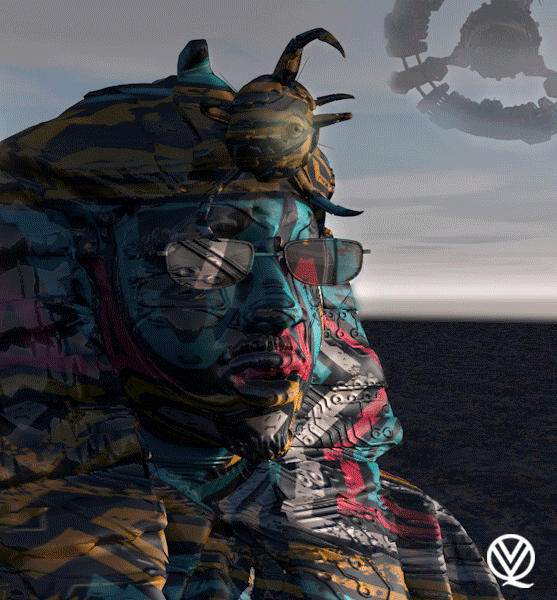TALES FROM THE DARK SIDE
WRITTEN BY
ANONYMOUS
ANONYMOUS
ARTWORK
BY
QUENTIN VERCETTY
QUENTIN VERCETTY
“I learned from my enemies. Beat them at their own game.”
- KILLMONGER IN BLACK PANTHER
It's a story we've been screaming forever, but no one wanted to hear. It’s the biggest elephant in Canada’s newsrooms that few wanted to talk about or even acknowledge. Now that the story is out, it has to be accompanied by substance. The story concerns everyone, but this moment is inevitably sourced from us: Black journalists and journalists of colour (JOC).
Racial tensions boiled over in Canadian newsrooms this past month as global protests against police brutality and anti-Black racism have forced the issue into institutions. The result feels like a reckoning of sorts as major Canadian media figures have been sidelined after complaints of their racist behaviour surfaced.

The CBC’s Wendy Mesley, long a fixture at the corporation with her own show, was suspended for using the “N-word” in editorial meetings. Stylist and media personality Jessica Mulroney spit a different chorus inside the same song losing her show on CTV after news of her trying to intimidate a Black influencer came to light.
It felt like an opening for real change had finally been punctured, that the excuse of cluelessness was crumbling away, no longer able to protect even Canada’s most celebrated media darlings.
This emboldened BIPOC journalists (particularly younger ones) to come forward with their horror stories while working in newsrooms across the country. I have close ties to some of these institutions and many of these journalists. I’ve worked in just about every sector in mainstream Canadian media and have many tales to tell from the dark side.
But understand this is not about racism or racist activities in the media as much as it is about a way of life in this country. Yes, there is something wrong with the make up of our newsrooms, but if that's what we concentrate on, then we are missing the bigger picture.
Many Canadian outlets have taken it upon themselves to cover stories like Mesley’s or Mulroney’s (though they’re just the tip of an iceberg). This bolsters the image of a self-reflective industry willing to reckon with itself and to finally be honest enough to change. I don’t see it that way.
What I see is a rare moment of self-reflection that still comes at the expense of younger Black and JOC. These journalists have to throw their former/current bosses and/or colleagues under the bus for today’s stories to come out. And there’s nothing to suggests to me that those in charge are going to go easy on these whistleblowers in the years to come.
The stories done by (almost all white) journalists covering this moment will end up being an “edgy” byline in their portfolios, but they’ll make little to no impact. Their Black and JOC sources, many of whom are identifiable even with anonymity, are left out to dry.

All this makes the cynical side of me think that Canadian media’s deep-seated problems are actually not reformable. Everything outside of a revolutionary overhaul — something that completely remakes the entire landscape of the industry — would be putting lipstick on a 100-year-old pig.
So where does that leave us?
Journalists, especially freelancers who want the freedom to do the stories they love, shouldn’t be looking to reform the system, but to exploit it. That sounds like an obvious truism, but it’s getting lost in today’s pollyannaish calls for Black journalists and JOC to lead the reform of Canadian media. We are in no position to do so, and the burden is as self-congratulatory as it is unfair.
Rather, a mercenary mindset that balances self-interest with lifting up the person next to us is actually much more helpful and lasting than the feel-good “altruism” that today’s official media narrative pushes.
Instead of being martyrs to a moment, we have the right to maintain our challenges of the system within our immediate spheres of influence. These are the micro-decisions we make in newsrooms that carry way more weight than we credit them for. Sticking up for a younger colleague, confidently calling out a producer or host for racism, and escalating things to HR if necessary. And, if it doesn’t hurt their own standing or goals, airing stories to the media — the same outlets that cause many journalists so much grief.
The accumulation of these acts may not add up to a French Revolution, the guillotine-style beheading of the industry, but it will help fellow Black journalists and other JOC have better careers, which is what we’re all after — partly because sustained success is the best revenge.
Some make noise, some make moves. We choose to do both.
CREDIT
-
All pieces are from the series ‘Outside in the Republic’.
These are small selection of works created by Quentin VerCetty between 2013 to present. These digital imagining of the Republic is of an speculative afrotopia that consist of techno-fossils of youth of African descent as conceptual speculative sculptures.
COVER IMAGE ‘Beast of The Southern Planet’, by Quentin VerCetty, digital print on epson luster paper with augmented reality component, 2016.
IMAGE 1 ‘Ras Jamar Catch Ah Fiyah’, by Quentin VerCetty, lenticular print with augmented reality component, 2015.
IMAGE 2 ‘Galactic Q Animation’ by Quentin VerCetty.
︎ vercetty.com
